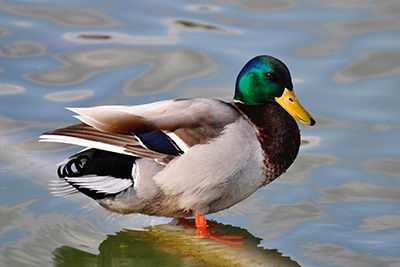
Feeding the ducks is a much loved activity for many, but over recent years there’s been a lot of debate about what you should feed ducks – and it raises a question, what do (and should) ducks actually eat?
Well, ducks are omnivorous birds which means they eat a wide range of different foods, both plant and animal, and often forage for meals and snacks. Feeding ducks, swans and geese is a great way to enjoy getting close to them and a really good way to connect with nature. But what can you feed ducks at your local park? Here are a few tips…
What do ducks eat?
In the wild, a duck’s diet will vary depending on their breed and habitat. Ducks that live near grasslands and parks will eat seeds, grass, and weeds, whereas ducks that live in wetlands will eat amphibians for example frogs, fish, and salamanders. If needs dictate, ducks will also eat molluscs, fish eggs, algae, worms, and insects.
In addition to these nutritious foods, some ducks consume sand, gravel, pebbles, and small shells to provide grit that aids their digestion. Grit can also contain trace amounts of vital minerals, such as calcium that help form part of their healthy diet.
Ducks and swans that live near ponds, parks and lakes often rely on supplementary feeding by the public and can be at risk of starvation without the extra food. If you can visit your local waterside, we would encourage you to take along some food and offer them a helping hand. You never know it could save their life.
Should ducks eat bread?
Feeding bread to swans and ducks is a fond pastime for people but, in some cases, this can be harmful to the birds. There are many healthier alternatives which are safer for both the birds and the environment.
When ducks and swans eat bread in excess, it can cause nutrient and vitamin deficiencies which have been linked to the development of Angel Wing. This condition causes structural issues and strain on the muscles, causing their wings to twist and drop open. In most cases of Angel Wing, excessive intake of carbohydrates, lack of Vitamin E and Magnesium have been present and this correlates with the lack of nutrition white bread provides. It is also important to note that bacteria can breed on any uneaten bread and this can attract rats and other unwanted vermin.
However, this doesn’t mean we have to stop our trips to the lake to feed the ducks. Giving birds the right food is good for both them and the environment. So next time you go down to the pond, why not take a healthier alternative such as our Swan & Duck Food and do your bit to protect our wildlife! You can read more about our ‘Better Than Bread’ campaign here.
What can I feed ducks?
There are many healthy, safe, and nutritious foods you can feed ducks, swans, and geese. The best foods contain minerals and vitamins that birds need for growth and development.
Some good foods to feed them include:
- Rice (This can be plain, brown, or white and it doesn’t matter if it’s cooked or un-cooked)
- Lettuce
- Peas
- Oats (rolled or porridge oats)
- Grapes (cut them in half first to avoid choking)
- Vegetable trimmings or peels
- WildThings Swan & Duck Food
WildThings Swan & Duck Food is an environmentally friendly and wholesome alternative. It is also extremely tasty, so you will quickly become the most popular person at the lake!

